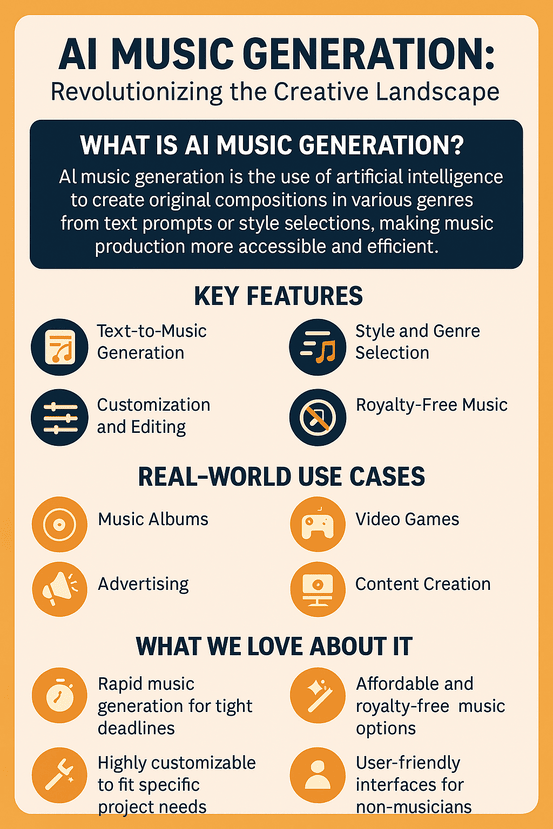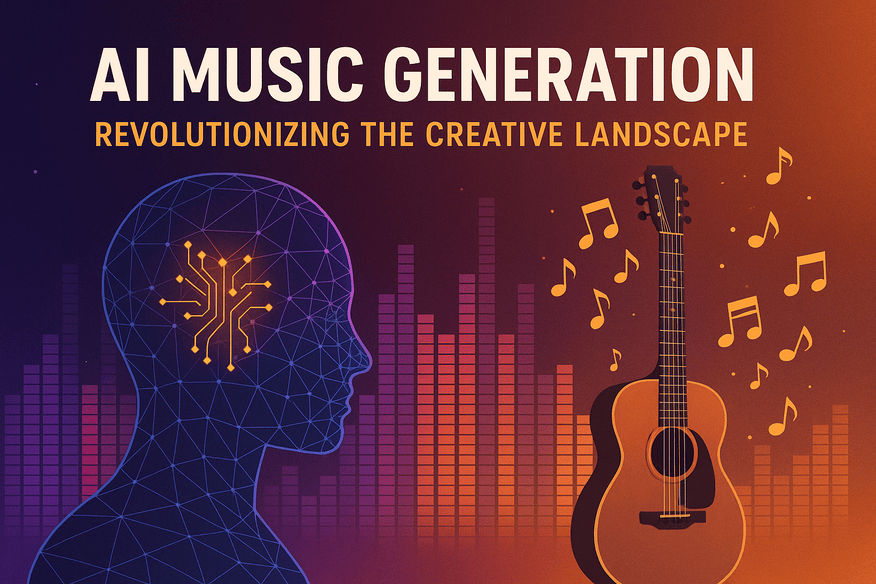What Is AI Music Generation?
AI music generation is the process of using artificial intelligence, particularly machine learning and deep learning techniques, to automatically create music, encompassing both symbolic forms (e.g., MIDI, sheet music) and audio outputs (e.g., waveforms, spectrograms). These tools analyze extensive music datasets to learn patterns, enabling the production of original compositions across various genres with minimal user input. From amateurs to professional musicians, users can generate background tracks, soundtracks, or complete songs quickly, often via text prompts or style selections. This technology is reshaping music production by making it more accessible and efficient, though it continues to evolve to match the emotional depth of human compositions ScienceDirect, 2022; arXiv, 2024.
Key Features of AI Music Generation
AI music generation tools offer a range of functionalities that enhance their utility across creative industries. Here are the core features, their benefits, and the AI technologies enabling them:
- Text-to-Music Generation: Users input text descriptions to generate corresponding music compositions. Powered by models like Transformers or Generative Adversarial Networks (GANs), this feature allows rapid creation of music tailored to specific prompts, as seen in tools like Udio and MusicFX arXiv, 2024.
- Style and Genre Selection: Users can choose from diverse musical styles, from classical to pop, ensuring the output matches desired moods or themes. This is achieved through style transfer techniques or genre-specific training datasets, a hallmark of platforms like AIVA, which supports over 250 styles AIVA, 2025.
- Customization and Editing: Tools provide interfaces to tweak generated music, such as adjusting instruments or song structure. This modularity, enabled by AI’s ability to generate separable music components, is prominent in SOUNDRAW’s editing features SOUNDRAW, 2025.
- Royalty-Free Music: AI generates music free from licensing issues, ideal for content creators. Platforms like Beatoven.ai ensure copyright-safe outputs by training on original datasets, reducing legal risks Beatoven.ai, 2024.
- Integration with Workflows: Support for formats like MIDI, MP3, or WAV, and integration with Digital Audio Workstations (DAWs), streamlines music production. AIVA’s MIDI output is particularly useful for professional editing AIVA, 2025.
- Monetization Options: Some tools offer plans allowing users to own full copyrights, enabling commercial use. AIVA’s Pro Plan, for instance, grants copyright ownership for monetization AIVA, 2025.
- User-Friendly Interface: Intuitive designs make these tools accessible to non-musicians, democratizing music creation. Tools like SOUNDRAW emphasize ease of use for beginners SOUNDRAW, 2025.
How Grok 4 Enhances the AI Music Creation Process
Grok 4, while primarily a large language model, plays a valuable supporting role in AI music generation workflows. With its 256K-token context window and advanced reasoning capabilities, it can generate detailed music prompts, lyrics, song structures, and metadata descriptions for AI music tools like AIVA or SOUNDRAW. Its real-time integration with X also allows musicians and producers to stay on top of trending genres and lyrical themes. Though it doesn’t compose audio directly, Grok 4 enhances the creative planning, storytelling, and metadata automation aspects of music production.
Real-World Use Cases
AI music generation is transforming various industries with practical applications:
- Music Albums: Taryn Southern’s 2018 album I Am AI was the first entirely composed and produced using AI tools like Amper Music, AIVA, and Google Magenta, achieving Top 100 status on US radio charts TheWrap, 2018.
- Video Games: Activision Blizzard employs AI to create dynamic music that adapts to player actions, enhancing immersion in games like World of Warcraft OpenDataScience, 2022.
- Advertising: AI-generated music featured in campaigns like The Most Wanted Azzaro and Red Lobster’s Cheddar Bay Biscuits, produced by Hyper Music and others, showcases its commercial viability Medium, 2022; VI-CONTROL, 2024.
- Content Creation: YouTubers and podcasters use tools like Beatoven.ai and ecrett music to generate royalty-free background tracks, simplifying content production Beatoven.ai, 2024; ecrett music, 2025.
- Film and Media: Independent filmmakers leverage AI tools like SOUNDRAW for affordable, custom soundtracks, though specific projects are less documented No Film School, 2023.
What We Love About AI Music Generation
AI music generation offers compelling advantages that make it a powerful tool for creators:
- Rapid Music Generation for Tight Deadlines: Produces compositions in seconds, ideal for time-sensitive projects like video content creation.
- Affordable and Royalty-Free Music Options: Eliminates licensing costs, benefiting budget-conscious creators SOUNDRAW, 2025.
- Highly Customizable to Fit Specific Project Needs: Allows precise tailoring of music to match project aesthetics, as seen in AIVA’s style models AIVA, 2025.
- User-Friendly Interfaces for Non-Musicians: Democratizes music creation, enabling anyone to produce professional tracks Beatoven.ai, 2024.
- Potential for Innovative and Unique Compositions: Generates novel music, pushing creative boundaries, as demonstrated by tools like MusicFX CineD, 2024.
- Advanced Features like Stem Separation and Real-Time Adaptation: Offers flexibility, such as Riffusion’s stem swapping and Activision Blizzard’s dynamic music Riffusion, 2025; OpenDataScience, 2022.
What Needs Work

Despite its strengths, AI music generation has limitations that require attention:
- Emotional Depth: AI music may lack the nuanced emotional expression of human compositions, potentially limiting its impact in storytelling ScienceDirect, 2022. Advanced natural language processing could enhance emotional interpretation.
- Repetitiveness: Outputs can be formulaic if training data is limited, reducing originality arXiv, 2024. Broader datasets could mitigate this.
- Quality Variability: Inconsistent quality requires multiple generations to find suitable tracks AIVA Review, 2023. Improved quality control algorithms could help.
- Ethical and Legal Concerns: Copyright issues and unclear ownership of AI-generated music pose challenges Oxford Academic, 2024. Ethical training practices and clear legal frameworks are needed.
Relevant Comparisons
| Dimension | AI Music Generation | Traditional Music Composition |
|---|---|---|
| Cost | Low to moderate ($10-$100/mo) AIVA, 2025; SOUNDRAW, 2025 | High (hiring composers, licensing fees) |
| Time | Seconds to minutes DigitalOcean, 2024 | Days to weeks |
| Customization | High, via parameters and editing tools AIVA, 2025 | Very high, but requires expertise |
| Quality | Variable, may lack emotional depth ScienceDirect, 2022 | High, with emotional nuance |
| Originality | Can be unique but sometimes formulaic arXiv, 2024 | High, depending on composer |
AIVA vs. SOUNDRAW
| Dimension | AIVA | SOUNDRAW |
|---|---|---|
| Music Quality & Variety | Excels in classical/symphonic, 250+ styles AIVA, 2025 | Broad genre range, genre blending SOUNDRAW, 2025 |
| Pricing | Free (3 downloads), Standard (€11/mo), Pro (€33/mo) AIVA Review, 2023 | Creator ($19.99/mo), Artist Unlimited ($99.99/mo) SOUNDRAW, 2025 |
| Usability & Features | MIDI output, DAW integration AIVA, 2025 | Stem downloads in higher plans SOUNDRAW, 2025 |
Pricing
AI music generation tools typically offer subscription-based models with free tiers for limited use and paid plans for professional needs. Free plans often include restricted downloads (e.g., 3 tracks/month) and shorter track lengths, suitable for non-commercial use. Paid plans, ranging from $10 to $100 per month, provide unlimited downloads, high-quality formats (MP3, WAV, MIDI), stem separation, and commercial rights. For example:
- AIVA: Free (3 downloads/month, credit required), Standard (€11/mo, 15 downloads), Pro (€33/mo, unlimited, full copyright) AIVA Review, 2023.
- SOUNDRAW: Creator ($19.99/mo, unlimited MP3), Artist Unlimited ($99.99/mo, MP3, WAV, stems) SOUNDRAW, 2025.
- Udio: Likely offers Free, Basic, and Pro plans, with pricing estimated at $10-$50/mo based on similar tools Reddit, 2024.
Final Verdict
AI music generation is a transformative tool for content creators, musicians, and media producers, offering rapid, affordable, and customizable music solutions. While it may not yet fully capture the emotional depth of human compositions, its accessibility and innovative features make it indispensable for modern creative workflows. As AI technology advances, its quality and versatility will likely make it a must-have, earning it a rating of 4.5/5 stars.
